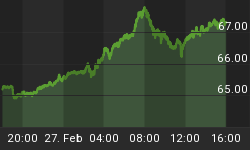I sometimes feel that the economy is living out the Hans Christian Andersen's fable called "The Emperor's New Clothes". He wrote the story back in 1837 about a vain emperor who hired a couple of charlatans that promise to make him the finest robes out of invisible thread. They convinced the Emperor that anyone not appreciating the sartorial splendor of the two swindlers should be deemed hopelessly stupid and unfit for their positions.
The current economic "recovery" and stock market rally have many similarities to Mr. Anderson's work. The underlying fundamentals behind the S&P 500's 180% advance since March of 2009 should be blatantly recognized as phony, even to a child. Yet traders and economists appear to willingly overlook the nakedness of it all.
There has been a subpar increase in personal income, employment, corporate revenue and GDP since the supposed end of the Great Recession back in the summer of 2009. But the key point to understand is, whatever phony growth that has been achieved came from governments' ability to borrow and print enough money to keep asset prices from plummeting. One can't say that equity and real estate values are soaring once again because the economy has healed, and therefore, it's has nothing to do with the Fed. Without the support of protracted and humongous monetary welfare, gratis of the central bank, debt levels, money supply and asset prices would need to contract to a level that can be supported by markets-rather than by government decree.
For example, the U.S. has incurred an additional $6 Trillion more in total debt than it had at the end of 2007. What our government and central bank have been able to achieve is set in stone our economy's addictions to debt, low interest rates and money printing by taking all of those conditions into incredible extremes. The Fed has kept the short end of the yield curve at zero percent for over five years and promises to keep interest rates there for as far as its eyes can see. Our central bank has also increased the amount of high-powered money from $800 billion to $4.2 trillion-and that number is still growing.
The economy and markets are much further away from removing the hand of government manipulations than at any other time in our nation's history. There has been no structural or entitlement reforms done at all. In contrast, Washington has succeeded in piling on an additional entitlement program (The Affordable Care Act), which the nation has no capability of paying for, adding to the myriad of entitlement programs that are already insolvent. Nothing of substance has changed for the good, only the government's ability to massively increase the amount of aggregate debt outstanding and appear to remain solvent by temporarily servicing that debt at an artificially-low rate.
Economically sensitive markets are clearly exclaiming that this recovery is naked. Industrial metals like copper have fallen 17%, while aluminum is down 10% YOY. Also, emerging market currencies and equity markets are reeling from the end of the dollar carry trade. However, faltering economic data in the U.S. has been conveniently and summarily dismissed due to winter's snow. But unless we are headed into another ice age, the excuse of cold weather will soon be undressed with the spring thaw.
The hole in the weather excuse is that the entire globe is showing signs of weakness. Chinese exports tumbled 18.1% from the year ago period, while the Shanghai stock market was down 12.5% during the same time frame.
The obscene amount of money printing by the Bank of Japan has caused the current account deficit to hit yet another all-time record high. The deficit for January was 1.59 trillion Yen ($15.4 billion) and the overall economy grew just 0.7% on an annualized basis in the final three months of 2013. This was a downward revision from the initially projected 1% growth rate.
The government of Japan is a paragon of the Keynesian experiment to avoid a cathartic recession by forcing higher the rate of money supply growth, depreciating the currency, levying new taxes, creating more inflation and drastically increasing the amount of aggregate debt outstanding. It has been well over a year since Abenomics took over in Japan and its failure should be nakedly obvious. Soaring debt levels, huge trade imbalances, a plummeting currency, a sputtering economy and insolvency are the tradeoffs for a stock market that is rising in nominal terms, and not yet back to the where it was before the Great Recession began over five years ago.
Given the above facts, it seems silly to buy into the belief that the global economy is on a sustainable growth pattern. Yet, the overwhelming majority of market pundits purport that fable to true. Perhaps, it is just more expedient and profitable to agree with what our leaders tells us is the truth, rather than to trust what our own eyes see and conscience dictates.
The sad truth is that global governments, in cooperation with their central banks, have now rendered much of the developed world insolvent. And that condition will be made evident to all once interest rates rise and the artificial support of bonds, stocks and real estate is finally, either voluntarily or involuntarily, removed.
For now, investors have decided to ignore the obvious and pretend that the economy-much like the townsfolk in Anderson's story--is in "excellent and magnificent" condition. But, once the economy crashes yet again, we will understand with the clarity of hindsight that the recovery was completely bare.
Michael Pento is the President and Founder of Pento Portfolio Strategies and Author of the book "The Coming Bond Market Collapse."















